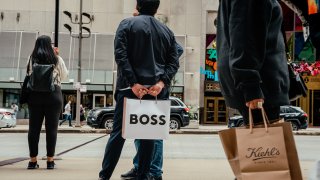
- The vast majority of adults (92%) have reduced their spending over the past six months, according to a poll fielded on behalf of CNBC by Morning Consult.
- Looking ahead to the all-important holiday shopping season, a warning for retailers: More than three quarters of all U.S. adults surveyed (76%) plan to cut back on spending for non-essential items.
- Higher-income Americans, meanwhile, are starting to feel a little better about the economy.
U.S. consumers have cut back on spending this year, and they plan to continue to do so through the holidays, a new CNBC-Morning Consult survey has found.
The vast majority of adults (92%) have reduced their spending over the past six months, according to a poll fielded on behalf of CNBC by Morning Consult, a company that conducts survey research to inform decision-making. The poll surveyed 4,403 U.S. adults between Tuesday and Thursday.
Get South Florida local news, weather forecasts and entertainment stories to your inbox. Sign up for NBC South Florida newsletters.
Consumers remain cautious in their spending and they're being more discerning about where and when to part with hard-earned cash. Inflation has come down, but remains stubbornly high. Broader economic uncertainty and labor unrest, amid striking auto workers in Detroit and writers and actors in Hollywood, have put consumer companies on watch.
The most common categories for spending cuts over the past six months were clothing and apparel (63%), restaurants and bars (62%), and entertainment outside the house (56%), a pattern that held steady from our June survey. The next biggest categories for cuts were groceries (54%), recreational travel and vacations (53%) and electronics (50%.)
Looking ahead to the all-important holiday shopping season, a warning for retailers: More than three quarters of all U.S. adults surveyed (76%) plan to cut back on spending for non-essential items and 62% expect to cut back on essential items "sometimes" or "more often" over the next six months, the survey found.
Money Report
Just how acutely consumers reported feeling the impact of the current economic situation varied among socio-economic groups. And it wasn't always those making the least that reported feeling most pinched.
More than half (55%) of households earning $50,000 or less (lower-income) said they're feeling the impact of the economy on their personal finances, while 61% of households $50,000 to $100,000 (middle-income) and 46% of households making at least $100,000 (higher-income) reported the same.
This marks a significant improvement in sentiment for higher income households from our prior survey. In June, more than half of higher-income consumers (55%) said they were feeling a negative impact on their finances. Higher-income households are in fact moving toward feeling that the economic situation is having a positive impact (30% in September, up from 21% in June.)






